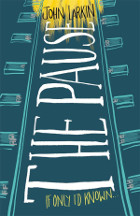The pause by John Larkin

Random House, 2015. ISBN 9780857981707
(Age: 14+) Highly recommended. Depression, Suicide, Relationships,
Psychiatric hospitals, Therapy, Future. When Declan sees the train
appear, he runs towards it but suddenly pauses, thinking about the
impact his death will have on those around him. His girlfriend, Lisa
has been sent to Hong Kong, the furthest her dragon mother can send
her away from Declan, and without a mobile phone, has not
communicated with him for days. He is absolutely bereft and long
forgotten trauma builds adding to his depression and anxiety. That
pause saves his life, and the novel, told in non chronological
scenes, tells us why and how he got to this point.
But Larkin is at pains to tell us in his opening letter that this is
not a suicide novel, rather one of hope and the reasons for living.
He has been at this point and wants readers to know the signs, to
know there is help, to know that life is worth hanging on to.
Told in first person, Declan reveals his growing relationship with
Lisa, the abject disdain of her mother, the waiting for a call from
her in Hong Kong, the build up of tension and anxiety as he comes to
the conclusion that their affair is over, and so the decision to
die.
His pause on the railway station sees him surrounded by caring
people, holding his hand, calming him down, talking gently to him.
The ambulance takes him to emergency with the ambo holding his hand
the whole time, and from there he is sent to a psychiatric unit.
Here he learns techniques to avoid stress, to be aware of the signs
of depression, to take medication that will help and he learns to
laugh.
In the background his parents are bickering, hints are given about
the dreaded Aunt Mary, and what seems an average family home,
becomes more splintered. The second part of the story in part
belongs to Lisa. Declan and his mother opt to got to Hong Kong for
their family trip and there he meets Lisa and she is able to tell
him what has happened to her. Overwhelming as her tale is she always
felt that Declan was there, propping her up, encouraging her to take
a stand against her mother, showing her that other families exist
quite differently. And Declan finally opens up to her about the
trauma of his past and the triggers which brought it all to the
surface.
This is a wonderful story. Declan is frank about his reasons for
thinking about suicide and just as frank about the pause. The story
breathes truth, the psychiatric unit resounds with people's lives
interrupted by trauma, and readers will be left knowing how to
approach their friends who are having a rough time and recognise
symptoms within themselves. Larkin has certainly achieved his aim of
writing about hope.
And I must point out the wonderful cover and book design, the
chapter headings and placement of the chapters, which all contribute
to an absorbing read.
This book unsurprisingly won the Queensland Literary Award in 2105
for Young Adult Novel.
Fran Knight